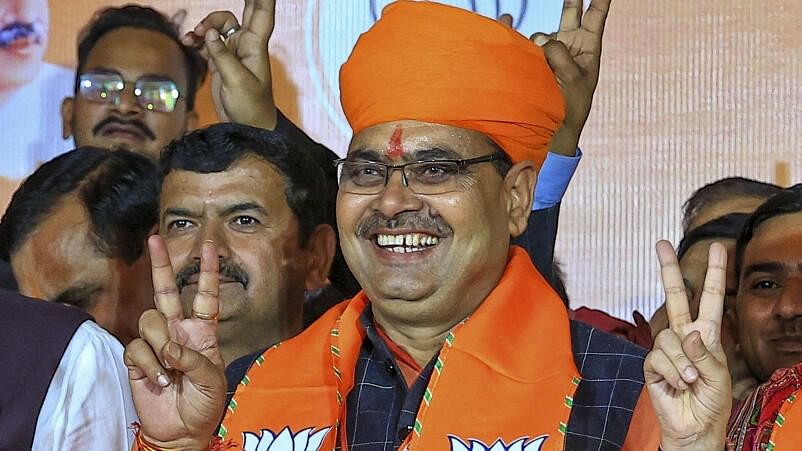
BJP MLA from Sanganer Bhajanlal Sharma flashes the victory sign after he was elected as the next Chief Minister of Rajasthan during BJP Legislature Party meeting, in Jaipur
Credit: PTI Photo
Jaipur: In a surprise move, the BJP announced Bhajan Lal Sharma as the next Chief Minister of Rajasthan. Little is known about the down-to-earth, unassuming leader, who has served as the Rajasthan BJP general secretary four times.
So when Bhajanlal’s name was proposed by former chief minister Vasundhara Raje, it took a while for most to place him amidst the high-voltage drama and suspense that preceded the entire event. His name was nowhere in the list that had been doing the rounds since BJP won the electoral race with a comfortable 115 in its kitty in a House of 200.
A Brahmin, Bhajanlal, 56, is a hard-working, conscientious worker with a strong grip on organisational matters. Hailing from Bharatpur’s Atari village in Nadbai tehsil, he started with student politics and was initially associated with BJP’s youth wing ABVP and later with RSS.
He is said to be close to Chandrashekhar, BJP’s state general secretary, Organisation, meaning the Sangh parivar. Chandrasehkhar is from UP, which shares its border with Bharatpur. The CM-designate is also said to be close to Rajasthan incharge and Rajya Sabha MP Arun Singh, who also hails from UP. Arun Singh is, in turn, known to be close to Rajnath Singh, who was one of the central observers. Their recommendations about him and his discreet way of getting organisational tasks accomplished, worked in his favour.
“His non-confrontational attitude is also exactly the opposite of Raje. He is someone, who would perhaps follow the diktat from Delhi obsequiously and he is low-key. Those were definitely the deciding factors,” Narayan Bareth, a senior political analyst, told Deccan Herald.
Plus the BJP’s generational change formula clicked in his favour.
“With age being on his side, Bhajanlal fits the bill as the BJP top brass was firm on a generational change in the leadership. He is unassuming and someone who would be liked by all MLAs and party workers. He would be able to take along everybody in the party,” Sunil Bhargava, head of BJP’s state research and policy wing told DH. Earlier, he was said to be close to Raje, as he hailed from Bharatpur near Raje’s Dholpur district. But when Raje lost in 2008, he moved away and is now not known to belong to any camp.
Bhajanlal had fought unsuccessfully from Nadbai in 2003 Assembly polls from Samajik Nyaya Manch, a party floated by Bikaner's tallest leader Devi Singh Bhati. Bhajanlal could then garner only 5969 votes.
But this time Bhajanlal, fought from Sanganer, one of BJP’s stronghold seats in Jaipur and won by a margin of 48081 votes over Congress’s Pushpendra Bharadwaj. He had polled 1,45,162 votes ie earned a vote share of 58.44 per cent in the constituency, comprising a mix of Brahmins, Baniyas and other castes. It is an economically vibrant constituency with the traditional block print industry being one of its major industries. The constituency was represented earlier by Jaipur mayor Ashok Lahoty, who was not given a ticket this time. After initial protests over Bhajanlal being an outsider in Sanganer, Lahoty and all BJP workers came around to support him.
A modest, humble and accessible person with no airs, say those who have worked with him. He has conducted many pressers and conferences held in the BJP office with alacrity.
“He is not insistent on addressing large crowds or having a group of hangers on around him. An unpretentious person, who micromanages to the last detail, he did not desist from addressing a small gathering of just about 100 people in a recently opened Gujarati tea-stall, Ketla Apa in his constituency and interacting with locals during campaign trail. This shows how down-to-earth he is,” says Sunny Sebastian, political analyst and author.
After a tribal CM in Chhattisgarh and an OBC CM in Madhya Pradesh, BJP settled for a Brahmin face here to appease the upper castes and allied castes of Baniyas, Vaishyas, Jains and Maheshwaris, who would not be upset with his selection.
Although Brahmins are not influential politically here, they form about 7 per cent of the total population and the other upper castes another 8 per cent. But upper castes including Brahmins from neighbouring states of UP and Haryana, form a large vote bank for BJP, which may be another factor for Bhajanlal’s selection.
With two deputy chief ministers Diya Kumari from the Rajput community and Prem Chand Bairwa from the SC community, BJP’s strategy in Rajasthan is to balance out the caste arithmetic.
Bhajanlal’s only drawback is that he is a political novice as he has no administrative or ministerial experience. “In BJP, you do not need to have such experiences. A battery of advisors would help the CM to learn the ropes,” says Bhargava.